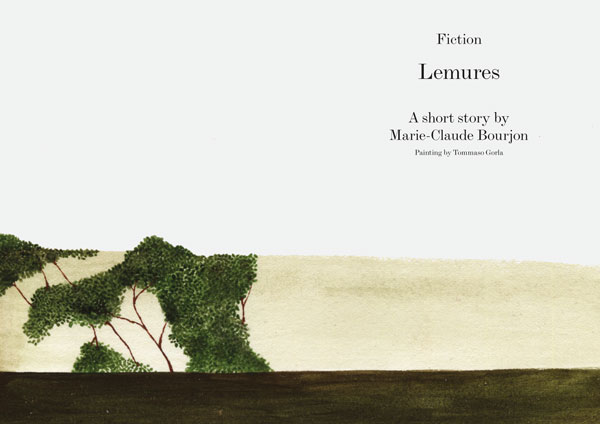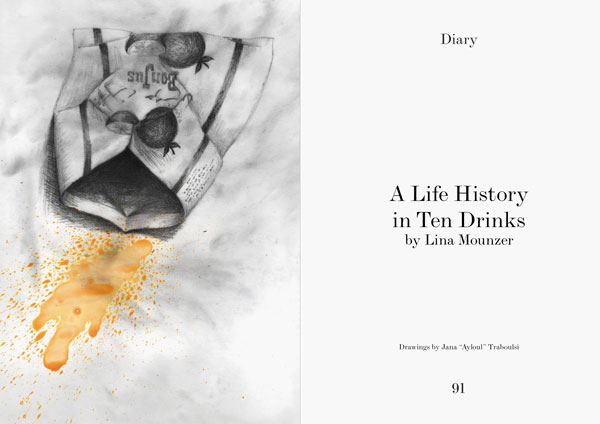Behind the Scenes: Berlin Quarterly
For its third issue, Berlin Quarterly has worked with Ibrahim Nehme, editor of Beirut-based The Outpost, to collect photography, reportage, fiction and poetry from the Lebanese capital.
The result is an abundance of human stories that go beyond the mainstream media’s sometimes simplistic portrayal of a war-torn city. I spoke with publisher James Guerin about how place influences the production of a magazine like Berlin Quarterly, and why art tells the best stories.

The name ‘Berlin Quarterly’ fixes the magazine very clearly in the German capital. Why is this sense of place so important?
There’s a spirit in Berlin that just makes things possible – and it’s different from New York, London, or Paris, where everyone seems to want to get ahead and work on their career. Here, it’s about what people create. They want to make something beautiful and worthwhile and lasting.
So the magazine isn’t actually about Berlin, but it sounds like the city has influenced your content in other ways?
I’ve said this before, but Berlin is more a state of mind than a real place. People can be free in terms of the way they want to live without any huge social pressure to conform, and they’re not judged in the way they can be in other places. So in terms of how it affects the magazine – it’s about looking at the world without prejudice. People are tired of reading about the city itself, about how it’s such a hip place. So we wanted to look outwards rather than inwards, but with that same state of mind and vision.

You’ve covered Belgrade, the Ukraine and Norway in previous issues, and in this one you visit Beirut. How do you decide which places you’re going to cover? Are they personal to you in any way?
It’s actually a coincidence that we explored geographic places in the first three issues. The next issue doesn’t have a geographical focus – just a subject that’s important to the world.
I used to work for an international company, so for 10 years I was travelling to India, the Middle East, Africa, China… I got to see a huge diversity of people and cultures, but not as a tourist. I have a passion for those places, especially Beirut, where I spent a lot of time and met a lot of people and really fell in love with the city. It’s nice to have an issue of Berlin Quarterly about Lebanon in order to show the world that it’s not just a one-dimensional place, torn by civil war and fighting. It’s actually really diverse and really interesting. You feel very alive there. It’s changing all the time, like Berlin I guess.
Was it important to have Ibrahim Nehme from The Outpost involved?
Yes, I wanted to do something on Beirut but I thought it wouldn’t be right for Cesare [Alemanni – Berlin Quarterly’s editor] and some other journalists to go there and look at it from the outside. It needed an insider to pick the artists and the other writers.
I met with Ibrahim in Berlin (he’s doing some great work in Beirut with The Outpost) and asked him to guest-edit the issue. He really knows his city and its nuances. That’s the reason it turned out so well.

There’s such a wide range of voices in each issue. Is that particularly important to you?
It’s very important, rather than giving a narrative, to look at a place through snapshots of culture. I really love the short story in the issue called The Engagement Party, for example. It just shows one part of Lebanese society – the wealthy upper class – and then the photography elsewhere in the issue shows a completely different side. I think it’s better to look at a subject from different angles and let the readers come up with their own view.
There is also a range of formats: reports, photo-essays, fiction, poetry, drawing. The result is a really holistic picture of the place, but how do you manage the balance between them?
Well, we’re a small group of people. Cesare is the editor and I’m the publisher but we all work together as a kind of editorial team, bouncing ideas off each other. I’m probably more interested in poetry and fiction whereas Cesare’s core skill as a writer is reportage. Also, we have a kind of loose editorial committee made up of friends and colleagues and professionals who give us a lot of advice and help us out.

You say you’d like to foster a mutual understanding in readers to help prepare for ‘challenges’ ahead. What are you referring to? How do you think Berlin Quarterly addresses these challenges?
The world is changing very fast, and for a lot of people it’s difficult to adapt. Empathy and tolerance are important in this, so it’s nice to show that every human has the same basic emotion no matter what their background is. You can do that through personal stories and through photography, fiction and poetry. That works better than just telling people what they should believe. There’s a message in art that’s humane in a way that politics sometimes isn’t.
—
Read more of the best magazines – sign up to Stack and we’ll deliver a different independent magazine to your door every month






